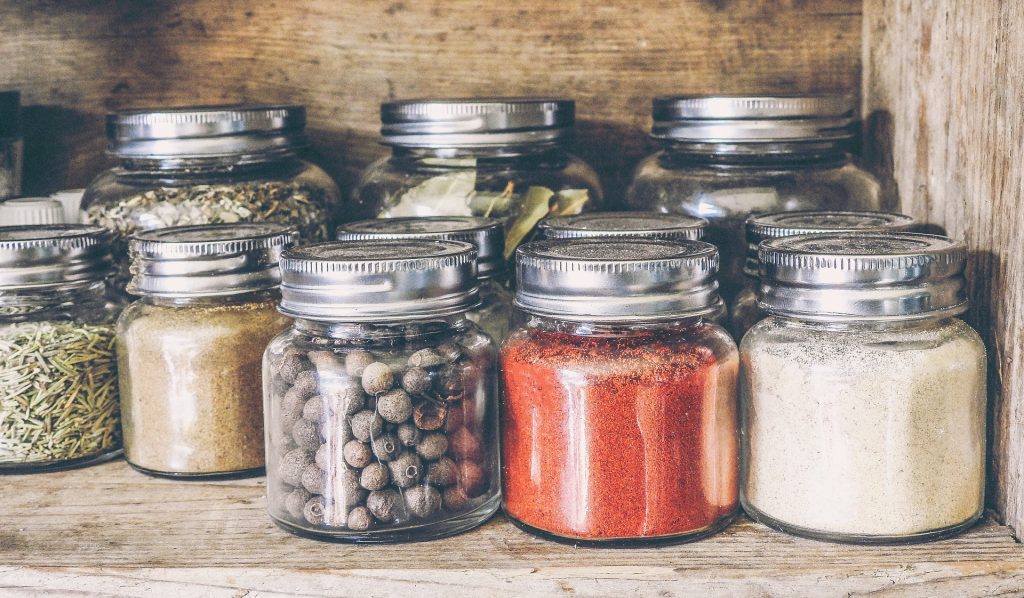Being a proud plant mother and a witch-in-training, I couldn’t find a better place to live than in Istanbul. The city thrives with spice shops and bazaars that sell all kinds of herbs, spices, and condiments.
These spice shops, aka aktars, are the true Turkish treasures as well as my favorite places in Istanbul. The first time I visited one, I had an impossible mission, or so I thought. Although my efforts to properly pronounce civanperçemi and ısırgan failed me, the sales assistant handed me the herbs I wanted. Thus, my mission impossible ended up with 100% success.

While herbs are extensively used in Turkish cuisine, this alternative-herbal life reflects itself especially in Turks’ attitude towards sickness. Whenever I’m sick, my colleagues rarely tell me to go to the doctor, let alone mentioning taking a day off. Instead, they suggest easy to prepare Turkish herbal remedies with ingredients you can find in every household.
On no account would I recommend these over visiting a doctor, yet, in the times of despair, they may come handy. Rather than trying to unravel the science behind these cures, I encourage you to take faith in the lore and let the old Turkish wisdom heal you.
Stomach Problems
If you have a sensitive stomach, you’ve likely heard plenty of times that you shouldn’t be drinking coffee. In Turkey, there is an exception to that – Turkish coffee! It is a common belief that a cup of Turkish coffee with no sugar is a great remedy for an upset stomach. What is even more surprising is that it actually does work, well, at least for me. I do drink it every day as a preventive method. One can never have too much Turkish coffee anyway, right?
The original version of Turkish coffee remedy, but a less conventional one, is kahve-limon. Simply pour 4-5 drops of freshly-squeezed lemon juice over a dessert spoon of Turkish coffee. This mixture, eaten twice a day, is believed to help with diarrhea. So far, despite many positive opinions, I didn’t dare try it.

For those who aren’t too fond of coffee, there is another solution. Quoting my good friend, “Turkish mothers tell you to drink nane-limon çayı (mint-lemon tea) for a bad stomach”. Turkish moms know best.
If you don’t like sour flavors in tea, we have a better solution: Fennel tea. It has a mildly sweet, anise-like taste. Fennel seeds are believed to be great for digestion problems.
Last but not least there is yogurt. Yogurt holds a sacred place in Turkish hearts and it seems it isn’t only because of the taste. I was advised that eating yogurt regularly can help keep the digestive system happy.
Hangover
Drinking water with lemon juice and a pinch of salt is a popular hangover remedy. It is also commonly used in Turkey. For those feeling that it isn’t Turkish enough, I recommend drinking ayran (or ayran with soda). An impeccable method!
Cold & Flu
One of my favorite herbal teas for cold, that is also widely accessible and popular, is linden tea (ıhlamur çayı). I will risk saying that you can find it in all markets, dried or in the form of teabags. Traditionally served with cinnamon – perfect for rainy, depressing autumn evenings. You may opt for rosehip tea (kuşburnu çayı), which is full of Vitamin C.

For fighting the flu, a common medicine is a honey-lemon-ginger syrup (bal, limon, zencefil kürü). The recipe is simple but requires some preparation and waiting time. Peel and finely chop a medium-sized ginger and place it at the bottom of a small jar. Add one sliced lemon, fill the jar with honey. You can also add cinnamon for taste. Put the jar in a dark spot for 24 hours. The next day, the mixture is ready and you can use it either by itself or add it to your tea. It lasts up to 2 months in the fridge.
Getting Pregnant
Turks believe that to get pregnant, women should be consuming, wait for it, figs. For someone coming from a cold climate where figs aren’t common, this surprised me. It gets even more surprising – Turkish doctors recommend this method as well! Ladies, write down the recipe: pour 500 ml of water in a pot, add 8-9 dried figs and cook for 7-8 minutes. If you are using fresh figs, cooking time should be 3-4 minutes. The mixture should be had two times a day – 1 hour before breakfast and 1 hour before the last meal of the day. Continue sipping this concoction for 21 days and you will soon find yourself shopping on e-bebek. Honorable mention for the stuff you shouldn’t consume when trying to conceive: mint, parsley, and sage.

Boosting Masculinity
Once upon a time, when Süleyman the Magnificent was sultan, his mother Hafsa Sultan got very sick. Despite all the efforts of doctors, she didn’t seem to get any better. In an act of despair, Suleyman wrote a letter to Merkez Efendi asking for help. This is the story behind the creation of Mesir Macunu, a paste containing 41 herbs, that cured Mrs. Hafsa. Nowadays mentioning Mesir Macunu brings a smile on Turks’ faces, as it gained fame for its masculinity boosting properties. The best place to buy this famous medicine is where it originated from – Manisa.
Children’s Health and Proper Development
I came across this one while reading children’s books in Turkish as part of my language learning attempts. At breakfast, children consume one or two spoons of pekmez for its energy boosting properties. Pekmez is a molasses syrup most often made from grapes. It contains vitamins as well as iron, potassium, magnesium, and calcium. These are crucial elements for proper child development. Adults can enjoy and benefit from this flavor too.

I promised no science behind medicines, but couldn’t help myself with this one. Because of the high content of iron, pekmez is especially recommended for those with low blood count. The dosage can be up to two spoons in the morning, eaten on an empty stomach.
All in all, Turks seem to have an herbal remedy for almost any disease you can think of. Next time you catch a cold, try stopping by the nearest aktar to see what herbs you will be prescribed. Who knows, it might help you heal even faster than conventional medicine.
Let us know your secret Turkish herbal fixes in the comments below!









